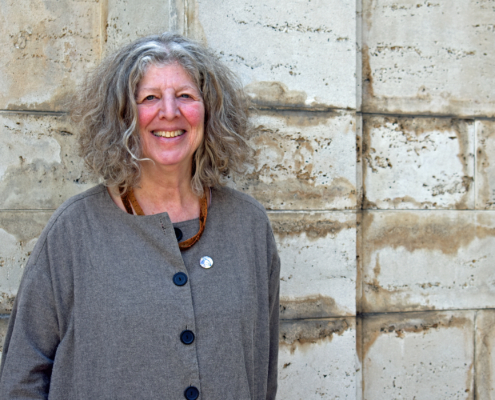 Ellen Pearlstein, professor in the Department of Information Studies and the UCLA/Getty Conservation Program, as well as a core faculty member of the Cotsen Institute, has been named a recipient of the 2021–22 Rome Prize from the American Academy in Rome. She will receive a stipend, workspace, and room and board at the eleven-acre campus of the Academy in Rome, starting in September 2021.
Ellen Pearlstein, professor in the Department of Information Studies and the UCLA/Getty Conservation Program, as well as a core faculty member of the Cotsen Institute, has been named a recipient of the 2021–22 Rome Prize from the American Academy in Rome. She will receive a stipend, workspace, and room and board at the eleven-acre campus of the Academy in Rome, starting in September 2021.
Rome Prize laureates are selected annually by independent juries of distinguished artists and scholars through a national competition in eleven disciplines, including historic preservation and conservation, for which Pearlstein was one of three awardees. While she had the option of choosing between a one-year and six-month residency, she chose six months “in balance with my commitments on campus.” She will complete one quarter teaching remotely and will take off one quarter on a sabbatical.
While at the Academy, Pearlstein will pursue research to enable her to “interrogate the ways in which museums that are detached from communities whose cultural materials they hold, such as European institutions with collections from the Americas, are negotiating these distances to achieve culturally appropriate care,” she explained. The Vatican Museum and the Luigi Pigorini National Prehistoric Ethnographic Museum are two Italian museums with major American indigenous holdings and with significant investments in redefining colonial museum practices. “Research activities include working with these museums to explore whether sharing digital surrogates, reaching out to diaspora communities of local cultural descendants, or other practices have offered viable alternatives to in-person sharing about conservation decision-making and consequent museum representation,” she added.
“My scholarship and teaching focus on conservation of indigenous materials from the Americas within a collaborative framework,” she continued. “I am proud that my research about innovative conservation practices and community collaboration with indigenous materials can be shared with graduate students who build on these concepts. My research in Rome will reinforce and expand upon the scholarship and teaching methods that I have developed and will provide the worldwide conservation community with new insights about the development of thoughtful methods for shared responsibilities in collections care, display, and scholarship,” according to Pearlstein.
She said she is most looking forward to being behind the scenes in museums, not only in Rome, but elsewhere in Europe. She did spend some days in Rome as a tourist years ago, and in 2011 was invited to the Vatican for a conservation initiative about working collaboratively. “Since then, I have spent more time in cities such as Turin and, most recently, in Milan, Asola, and Aosta, one more beautiful than the next. I am also looking forward to eating some wonderful meals, drinking some excellent wine, and wandering many beautiful streets steeped in history and beauty.”
To support our research and education in conservation and archaeology, or for more information, please contact Michelle Jacobson at mjacobson@ioa.ucla.edu.

